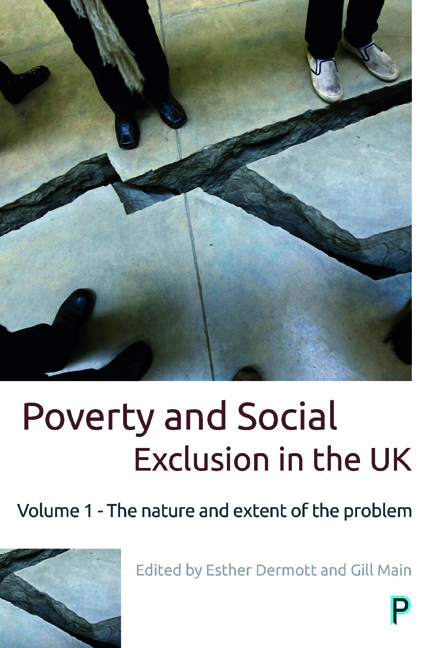Book contents
- Frontmatter
- Dedication
- Contents
- List of tables and figures
- Notes on contributors
- Acknowledgements
- Introduction: poverty and social exclusion in the UK
- One Measuring poverty in the UK
- Two The impoverishment of youth: poverty, deprivation and social exclusion among young adults in the Uk
- Three Improvement for some: poverty and social exclusion among older people and pensioners
- Four Which men and women are poor? Gender, poverty and social exclusion
- Five Better understandings of ethnic variations: ethnicity, poverty and social exclusion
- Six Improving lives? Child poverty and social exclusion
- Seven The cost of children: parents, poverty, and social support
- Eight A worsening picture: poverty and social exclusion and disabled people
- Nine Devolution and North/South division: poverty and social exclusion in the countries and regions of the UK
- Ten More similarities than differences: poverty and social exclusion in rural and urban locations
- Conclusion: innovating methods, informing policy and challenging stigma
- Technical appendix
- Index
Two - The impoverishment of youth: poverty, deprivation and social exclusion among young adults in the Uk
Published online by Cambridge University Press: 08 April 2022
- Frontmatter
- Dedication
- Contents
- List of tables and figures
- Notes on contributors
- Acknowledgements
- Introduction: poverty and social exclusion in the UK
- One Measuring poverty in the UK
- Two The impoverishment of youth: poverty, deprivation and social exclusion among young adults in the Uk
- Three Improvement for some: poverty and social exclusion among older people and pensioners
- Four Which men and women are poor? Gender, poverty and social exclusion
- Five Better understandings of ethnic variations: ethnicity, poverty and social exclusion
- Six Improving lives? Child poverty and social exclusion
- Seven The cost of children: parents, poverty, and social support
- Eight A worsening picture: poverty and social exclusion and disabled people
- Nine Devolution and North/South division: poverty and social exclusion in the countries and regions of the UK
- Ten More similarities than differences: poverty and social exclusion in rural and urban locations
- Conclusion: innovating methods, informing policy and challenging stigma
- Technical appendix
- Index
Summary
Introduction
Drawing on data from the Economic and Social Research Councilfunded 2012 UK Poverty and Social Exclusion survey (PSE-UK 2012), this chapter examines the nature, extent and social distribution of vulnerability to poverty and social exclusion among 18–29-year-olds living in private households in the UK. As discussed elsewhere in this volume, the PSE-UK 2012 is largest and most comprehensive survey on poverty ever conducted in the UK and updates earlier comparable studies conducted in 1990 and 1999. These data can therefore advance our understanding of youth disadvantage in important ways. First, it is now well established that indirect, income-based poverty measures can provide a misleading impression of command over resources and are uninformative about actual living conditions and living standards. As I will argue here, this is especially important in understanding the situation of youth and emphasises the importance of supplementing income data with direct measures of deprivation of basic necessities among young adults. Based upon analysis of the PSE-UK 2012 dataset this chapter therefore examines the extent of social and material deprivation among young adults and how the profile of vulnerability to deprivation compares with income-based estimates.
Second, the PSE methodology allows for meaningful comparisons over time and specifically with the PSE-GB 1999. By comparing data for 1999 and 2012, this chapter therefore also examines how the nature, extent and distribution of youth poverty have changed over the 1999 to 2012 period. In doing so I seek to examine how the profile of vulnerability to youth disadvantage changes across time and the extent to which any variations may be ‘explained’ by wider changes in the context of youth transitions – most notably as a result of the 2008 economic crises and subsequent austerity policies that have been pursued in the UK and elsewhere. This chapter reveals the shocking growth in social and material deprivation among UK youth over this period and should be a stimulus to more concerted policy action to tackle youth poverty and exclusion. The chapter therefore concludes with some observations on the social policy implications of these findings and how analyses like these can inform the more effective development of policies to tackle youth disadvantage. Before reviewing the empirical evidence, I first contextualise these findings in relation to wider evidence on the situation of youth in the UK and how this has changed as a result of recession and austerity policies.
- Type
- Chapter
- Information
- Poverty and Social Exclusion in the UK Vol 1The Nature and Extent of the Problem, pp. 41 - 60Publisher: Bristol University PressPrint publication year: 2017



